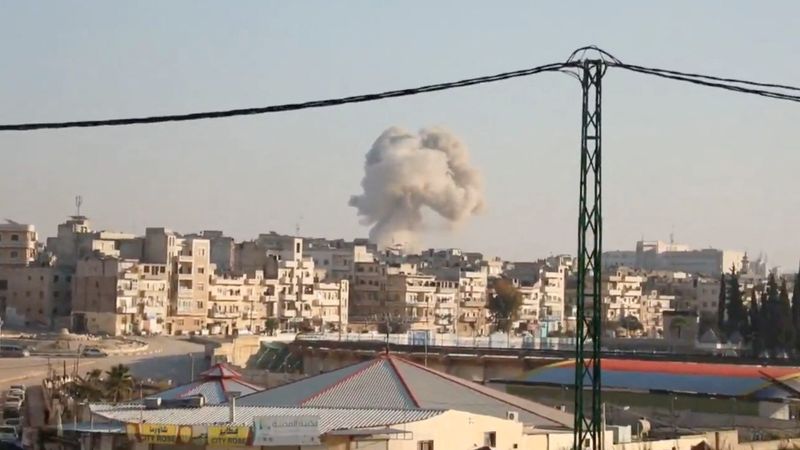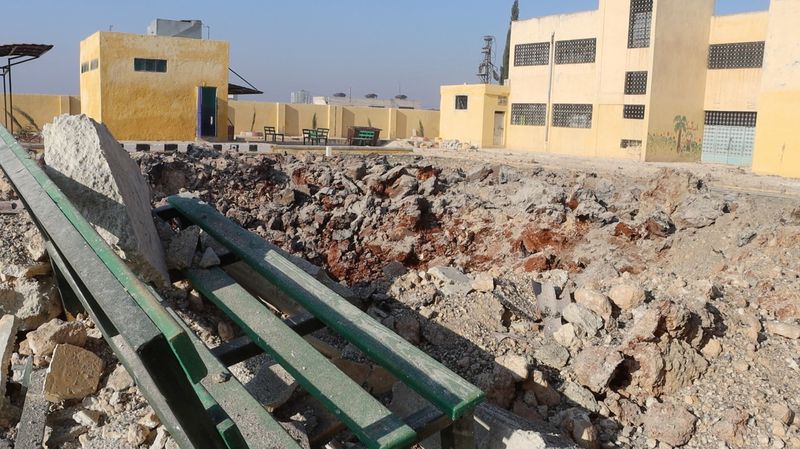By Suleiman Al-Khalidi
AMMAN (Reuters) -Russian and Syrian jets struck the rebel-held city of Idlib in northern Syria on Sunday, military sources said, as President Bashar al-Assad vowed to crush insurgents who had swept into the city of Aleppo.
Residents said one attack on the second day of raids hit a crowded residential area in the centre of Idlib, the largest city in a rebel enclave near the Turkish border where around four million people live in makeshift tents and dwellings.
At least seven people were killed and dozens injured, according to rescuers at the scene. The Syrian army and its ally Russia say they target the hideouts of insurgent groups and deny attacking civilians.
On Saturday, Russian and Syrian jets bombed other towns in Idlib province, which had fallen completely under rebel control in the boldest rebel assault for years in a civil war where front lines had largely been frozen since 2020.
Insurgents swept into the city of Aleppo, east of Idlib province, on Friday night, forcing the army to redeploy in the biggest challenge to Assad in years.
In remarks published on state media, Assad said: "terrorists only know the language of force and it is the language we will crush them with".
The Syrian army said dozens of its soldiers had been killed in the attack on Aleppo.
On Sunday, the army said it had recaptured several towns that had been overrun in recent days by rebels. The insurgents are a coalition of Turkey-backed mainstream secular armed groups along with Hayat Tahrir al-Sham, an Islamist group that is the opposition's most formidable military force.
Hayat Tahrir al-Sham is designated a terrorist group by the U.S., Russia, Turkey and other states.
The war, which has killed hundreds of thousands of people and displaced many millions, has ground on since 2011 with no formal end. But most major fighting halted years ago after Iran and Russia helped Assad's government win control of most land and all major cities.
CIVILIANS LEAVE ALEPPO
Inside Aleppo city, streets were mostly empty and many shops were closed on Sunday as scared residents stayed at home. There was still a heavy flow of civilians leaving the city, witnesses and residents said.
Armed rebel fighters waving the opposition flag drove through the city, Yusuf Khatib, a resident, told Reuters by phone. Some rebels took up positions on street intersections, he added.
Ahmad Tutenji, a merchant in the affluent New Aleppo neighbourhood, said he was surprised how quickly the army left. "I am shocked at how they fled and abandoned us."
Abdullah al Halabi, a pensioner whose neighbourhood was bombed near the central area of Qasr al Baladi, said people were terrified they would see a repeat of the Russian-led bombing that killed thousands of people before driving out rebels a decade ago.
Syrian troops who had withdrawn from the city were now regrouping and reinforcements were also being sent to help in the counter-attack, army sources said.
Aleppo had been firmly held by the government since a 2016 victory there, one of the war's major turning points, when Russian-backed Syrian forces besieged and laid waste to rebel-held eastern areas of what had been the country's largest city.
Rebels said on Sunday they had pushed further south of Aleppo city and captured the town of Khansir in an attempt to cut the army's main supply route to Aleppo city.
Rebel sources said they had also captured Sheikh Najjar estate, one of the country's major industrial zones.
Reuters could not independently confirm the battlefield accounts.
Iran sent thousands of Shi'ite militias to Syria during the Syrian war and, alongside Russia with its air power, enabled Assad to crush the insurgency and regain most of his territory.

A lack of that manpower to help thwart the rebel onslaught in recent days contributed to the speedy retreat of Syrian army forces, according to two army sources. Militias allied to Iran, led by Hezbollah, have a strong presence in the Aleppo area.
Israel has also in recent months stepped up its strikes on Iranian bases in Syria while also waging an offensive in Lebanon which it says has weakened Hezbollah and its military capabilities.
